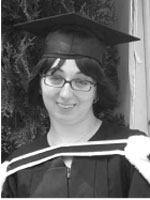Success in STEM
Marie-Eve Veilleux – Disability in Science: A Student’s Success

Marie-Eve Veilleux was a speaker at the NEADS conference in Ottawa in November 2008. She told delegates in the workshop presentation that when she was 18 months old, she was diagnosed with a severe form of arthritis that caused extensive mobility problems and progressively destroyed her knees, hips, wrists, and fingers. This made writing and carrying books extremely painful, and her academic life even more difficult. The disease attacked all her joints. After many painful surgeries, Veilleux regained the use of her legs, “but it is still hard to walk,” she said.
Veilleux, who holds a Bachelor’s degree in Microbiology and Immunology, began studying at McGill University out of pure interest in learning more about her condition, although she knew she would never be able to work in a lab. Pursuing a science degree – which involves working in labs, writing papers, and conducting research – was not the easiest choice. She was at the conference to prove that it was possible, “because I did it,” said Veilleux.
She explained that she collaborated with the Office for Students with Disabilities at McGill to find creative ways to meet her degree requirements. Her strategy was to involve people every step of the way. Common accommodations were available to her from the very beginning, for which Veilleux was grateful. However, she said, she wished to elaborate on some of the difficulties that students with disabilities face in science programs involving laboratory work.
The visually impaired are particularly challenged when asked to use microscopes to identify the color of bacteria, for example. Veilleux said she was unable to perform some of the most elementary tasks, such as handling a pipette or doing up the buttons of her lab coat. She was provided with a personal attendant whose duty was to do what Veilleux could not – tie her hair, put on her gloves, perform her practical exams. Veilleux would analyze the results and answer the questions.
This was not the best solution, she admitted. It was uncomfortable to continually ask someone to do things for her. So the following year, instead of being provided with an attendant, Veilleux was put in a team of three students instead of the usual two. In this way, while two students did lab work, Veilleux watched and wrote down data. Her practical exam was switched to a written exam. She would describe the experiments and the results and write a conclusion. This new approach worked. It eliminated her anxiety and stress, thus improving her academic performance.
Veilleux encouraged students with disabilities to collaborate with university staff to find appropriate arrangements and to talk to professors directly, rather than involve a greater number of people. “Sometimes it is better,” she said. “Sometimes, you just don’t have the energy.”
When it comes to requesting and getting accommodations, Veilleux said, there are no right or wrong answers. Students must find their own way.
The heavy course load in science is also a problem, Veilleux said. Students who are already stressed with coping with a disability could find the stress of theoretical courses overwhelming. Veilleux discovered after starting the program that she could become a part-time student, which markedly improved her grades and her quality of life. Veilleux encouraged students with low energy levels to consider becoming part-time students and to apply for scholarships. She said policies that award scholarships to full-time students only—which she is still fighting—should not prevent anyone from applying.
After completing her science degree, Veilleux learned that finding a job was not easy. Most advanced career paths that suited her physical limitations did not interest her. It was then that she discovered her passion and talent for language and became a scientific translator. Her academic goal for 2009 is to pursue a Master’s in Epidemiology, a post-graduate science program that involves statistics, not labs.
Veilleux said her greatest pride was having proven all naysayers wrong. She said she hoped her example would encourage all persons with disabilities to apply to their program of choice.

 Quick Question:
Quick Question:

